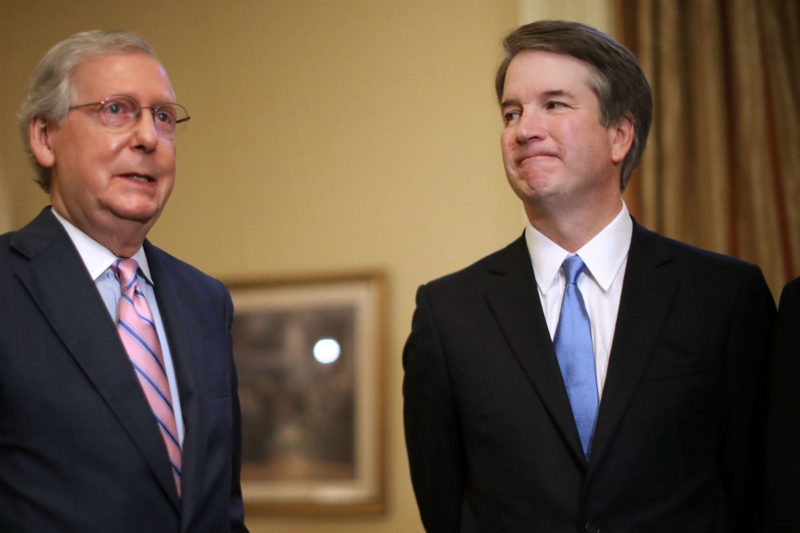There Is No Liberal Case for Brett Kavanaugh
Take Trump's pick to replace Supreme Court Justice Anthony Kennedy at his word. Brett Kavanaugh doesn't believe in a constitutional right to abortion.

President Donald Trump had barely left the White House Monday night with his pick to replace the retiring Supreme Court Justice Anthony Kennedy, D.C. Circuit Court Judge Brett Kavanaugh, before the “liberal’s case for Brett Kavanaugh” pieces started to run, including assurances that he was the greatest carpool dad in town.
Let me be blunt: There is no liberal case for Brett Kavanaugh. None. So let’s stop this nonsense right now. I don’t care how good the man is at managing a carpool; his beliefs are dangerous. And he is about to be handed the keys to the most powerful Court in the land.
Some of these articles have relied on Kavanaugh’s statements that he will “respect precedent” as an assurance that he wouldn’t, at the first opportunity, vote to upend Roe v. Wade. But Kavanaugh doesn’t respect Roe as a precedent. All we have to do is take him at his word.
As law professor David Cohen pointed out, as recently as September Kavanaugh was publicly praising former Supreme Court Chief Justice William Rehnquist’s dissenting opinion in Roe. And he didn’t just do so a little. He praised the dissent a lot.
Rehnquist’s dissent in Roe rejects the constitutional right to privacy and an abortion and instead takes the “originalist” position that those rights simply do not exist—because, at the time of our nation’s founding and then also at the passage of the 14th Amendment, from which the right to privacy derives, some states had abortion restrictions. Basically, according to Rehnquist there could be no constitutional right to an abortion because a handful of white male property owners didn’t recognize one.
This is what Kavanaugh has to say about Rehnquist’s vision of reproductive autonomy as set out in that dissent: “Rehnquist’s dissenting opinion did not suggest that the Constitution protected no rights other than those enumerated in the text of the Bill of Rights. But he stated that under the Court’s precedents, any such unenumerated right had to be rooted in the traditions in conscience of our people.”
In other words, for Kavanaugh, the Constitution was designed to protect the interests of white male patriarchy—those “traditions in conscience”—and it is the Court’s job to define individual rights in relation to upholding those interests. It is quite simply an exercise in defending white male supremacy and using the law as a principal means to do so. He’s not even shy about it.
Kavanaugh goes on to note that in his Roe dissent Rehnquist suggests an outright abortion ban might be unconstitutional. And to a casual observer, such a nod appears to signal that Kavanaugh has a limit: that he would not vote to end abortion rights outright. But that is a mistake.
In addition to authoring a dissenting opinion in Roe, Rehnquist also signed on to Justice Byron White’s dissent in Doe v. Bolton. Doe is a companion case to Roe that challenged Georgia abortion restrictions.
White’s dissent in Doe is nothing short of an indictment against the humanity of pregnant people. “The Court apparently values the convenience of the pregnant mother more than the continued existence and development of the life or potential life that she carries,” White wrote.
In Doe and Roe, Rehnquist plays a cynical and pernicious role. First, he lets White’s dissent do the real heavy lifting in attacking the rights of a pregnant person directly. Rehnquist signed on to this opinion. He is endorsing White’s view. Only he’s not getting his hands as dirty, so to speak. Then in Roe, the roles reverse and it is White signing on to Rehnquist’s position that restrictions on reproductive autonomy should only have to pass the most minor of constitutional tests before a court accepts them. From this position, Rehnquist emerges as the “reasonable” voice of the two dissenters, but in reality there is no actual difference between them. They both end at the same place: denying a pregnant person their right to reproductive autonomy.
But Kavanaugh isn’t just aspiring to be the kind of politically calculating Justice Rehnquist was when it came to abortion rights. He’s already living that truth as a judge on the D.C. Circuit Court of Appeals. Kavanaugh argued vigorously for the government’s right to “refrain from facilitating” access to an abortion for an undocumented minor in its custody, issuing an order in the case that would have effectively pushed the pregnancy at issue too late to abort under Texas law. Like Rehnquist’s positioning in his dissent in Roe, Kavanaugh’s opinion is one that fundamentally denies reproductive autonomy all while purporting to be respecting the bounds of the law.
If Kavanaugh using his power as a sitting judge to manipulate the law to force a minor to give birth isn’t an indication he’s hostile to abortion rights, I sincerely don’t know what is.
Finally, I’m taking Trump’s word that Kavanaugh will vote to end Roe one way or another. Like Trump’s promise to institute a Muslim ban, which his administration did and which the conservatives on the Supreme Court blessed, we need to believe him. He promised a Supreme Court nominee that would overturn Roe v. Wade. And with Brett Kavanaugh’s nomination he’s delivering on that promise.

